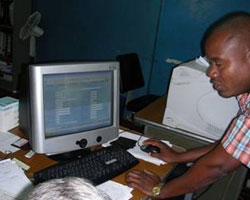Artemisinin-based Combination Therapies Effective in Treating Drug-resistant Malaria
 |
||
| Photo from left to right of Alfredo Bia (Medimoc-MOH), Deogratias Gasguro (SCMS), Juliet Morgan (CDC) and Ralph Rack (JSI) in a MOH Warehouse, checking the first shipment of USAID-funded Coartem that arrived in Mozambique. It contained 122,310 treatments. Source: Dimitri Peffer/USAID | ||
The President’s Malaria Initiative (PMI), a historic $1.2 billion, five-year initiative to control malaria in Africa, uses a comprehensive approach to prevent and treat malaria by supporting four key areas; indoor spraying of homes with insecticides, insecticide-treated mosquito nets, lifesaving anti-malarial drugs, and treatment to prevent malaria in pregnant women.
As malaria has adapted and evolved over time, the drugs used to treat the disease have stopped offering the protection they once afforded. Resistance has developed to nearly all of the commonly used anti-malarial drugs, rendering many of them ineffective. This increase in drug resistance brings more pressure to bear on the international community to find more robust treatments to fight malaria.
A treatment derived from the Artemisia annua plant, a Chinese herb that has been used for many years to treat fever, is extremely effective against malaria with only minimal side effects. Artemisinin-based combination therapies (ACTs) are the most effective and rapidly acting drugs currently available for treating malaria. ACTs work against “resistant parasites” and are especially effective when combined with other anti-malarial drugs, especially in treating the most dangerous form of the disease – falciparum malaria.
Most sub-Saharan African nations have now designated ACTs as their treatment of choice for malaria, and purchase of these drugs is being funded by the Global Fund, PMI, and other donor agencies.
The drug is taken orally over the course of three days and very rapidly eliminates the parasite from the body, wiping out malaria’s flu-like symptoms, such as fever, headache, nausea, and chills.
 |
||
| Photo of Alfredo Bia consulting antimalarials stock levels on the SIGM. The SIGM is a computerized drug management system that is funded by USAID and developed by DELIVER and SCMS for the Mozambican MOH. Source: Dimitri Peffer /USAID | ||
PMI treatment activities include supporting the purchase and use of drugs to treat uncomplicated and severe malaria; disseminating information about the correct use and advantages of prompt ACT; setting up management and logistics systems for their distribution through the public and private sectors; and training health care workers and community caregivers in their use.
USAID has aggressively supported the development of ACT as a safe and effective alternative treatment. USAID is working very closely with the World Health Organization; the Global Fund to Fight AIDS, Tuberculosis and Malaria; Roll Back Malaria; and pharmaceutical companies to accurately forecast drug needs, and USAID has partnered with agricultural concerns in east Africa to help farmers grow the Artemisia annua plant from which the drug is extracted.
In Fiscal Year (FY) 2006, PMI allocated almost $2.4 million for the procurement of ACTs and anti-malarial drugs (out of the total PMI budget of $30 million) in the first three focus countries – Uganda, Tanzania, and Angola. In FY07, PMI is allocating nearly $19 million for ACTs and anti-malarial drugs in seven focus PMI countries, expanding to Malawi, Mozambique, Rwanda, and Senegal.